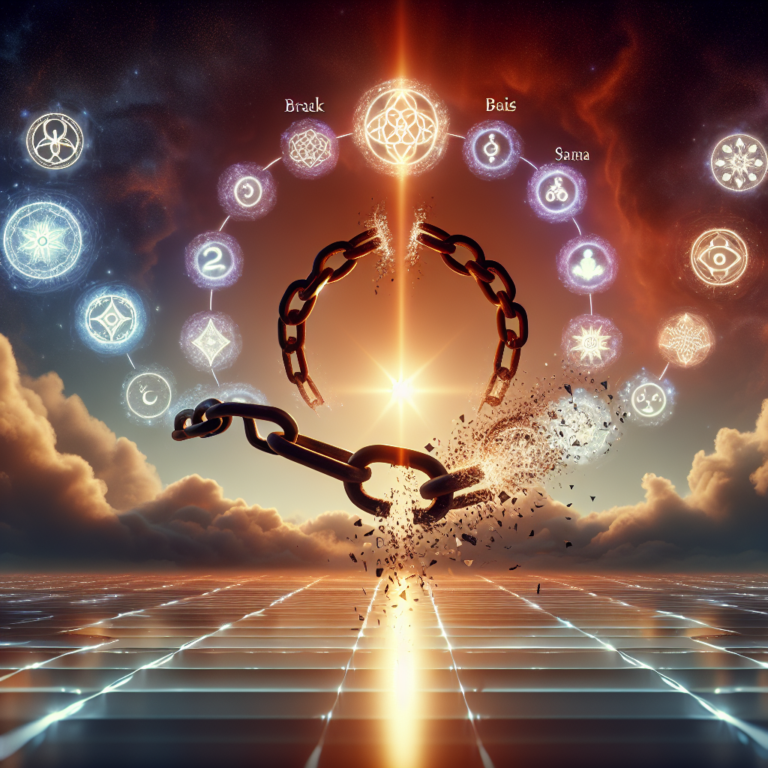The Karma Connection: How Our Actions Shape Our Spiritual Journey
Karma, a term deeply rooted in Eastern philosophies, particularly Hinduism and Buddhism, has transcended its religious origins to find relevance in the lives of many who seek to understand the interconnectedness of actions and the consequences that follow. At its core, karma refers to the law of moral causation: the belief that our actions, whether good or bad, dictate our spiritual path and ultimately influence our experiences in this lifetime and beyond.
Understanding Karma
Karma is derived from the Sanskrit word "kri," which means "to do" or "to act." It encompasses all intentional actions—physical, verbal, and mental. Each action creates an imprint, contributing to the vast tapestry of one’s life and affecting the trajectory of one’s spiritual journey. The principle extends beyond mere punishment or reward; it’s more about holistic growth, learning through experiences, and the evolution of the soul.
Karma operates on different levels, including:
Individual Karma: Actions taken by an individual that create consequences for themselves. This is the most personal level, encompassing daily choices, behaviors, and their repercussions.
Collective Karma: The overarching consequences of actions taken by groups, societies, or cultures. This level addresses systemic issues and collective experiences, often shaping societal norms and expectations.
- Karma from Past Lives: Many belief systems hold that actions from previous incarnations can influence current experiences. This perspective—that we carry the legacies of our past actions—suggests that our spiritual journey is more expansive than just this life, intertwining with previous existences and lessons.
The Cycle of Actions and Consequences
The cycle of action and consequence, also known as the "law of cause and effect," plays a pivotal role in shaping our spiritual journey. Every intentioned action leads to a reaction, and this chain of events influences our current state and our future conditions.
Positive Actions: Acts of kindness, compassion, and service create positive karma, leading to beneficial outcomes. For example, helping someone in need not only lifts their burden but can create a ripple effect that may return the favor in unexpected ways. Individuals who cultivate positive thoughts and actions often report a sense of fulfillment and spiritual growth, reinforcing the idea that our energies shape our realities.
- Negative Actions: Conversely, harmful actions generate negative karma, which may manifest as suffering, hardship, or loss. Holding onto grudges, deceit, or malice can create a heavy burden on one’s soul, leading to stagnation rather than growth. The intention behind an action significantly affects the outcome, which goes hand in hand with the idea that ignorance or unawareness can lead to unintentional harm.
Karma and Spiritual Growth
Recognizing how actions shape one’s spiritual journey leads to profound personal growth. Here are some ways karma influences spiritual evolution:
Self-Awareness: Understanding karma increases self-awareness. When individuals contemplate their actions and their subsequent outcomes, they develop an acute consciousness of their behavior. This insight can foster a more mindful existence, where actions are taken with intention rather than impulse, promoting spiritual elevation.
Learning from Experiences: Karma provides the framework for learning. Life’s challenges can be viewed as lessons that promote resilience and wisdom. For example, someone who experiences betrayal may learn the importance of trust and forgiveness, ultimately leading them down a path of emotional healing and growth.
Interconnectedness: Afaking karma reminds individuals of their interconnectedness with others and the world. The realization that our actions affect not just ourselves but the collective encourages compassion and unity, essential attributes for spiritual awakening.
- Detachment and Acceptance: Embracing the concept of karma can cultivate a sense of detachment and acceptance, recognizing that life unfolds as it should. For instance, if faced with perceived injustices, individuals may learn to let go and trust that karma will balance the scales in its own time.
Practical Applications of Karma in Daily Life
To harness the power of karma, individuals can adopt practices that foster positive energies and cultivate beneficial habits. Here are some practical applications:
Mindful Living: Engage in mindfulness to enhance self-awareness. This includes being present during interactions, intentional in thoughts, and conscious of the implications of actions.
Acts of Kindness: Prioritize kindness in daily activities. Simple acts, such as complimenting others, helping a stranger, or volunteering time, can generate positive karma.
Forgiveness: Letting go of past grievances frees emotional space and cultivates peace. Engaging in practices that emphasize forgiveness can heal wounds, both personal and communal.
Gratitude Practice: Maintaining a gratitude journal or daily reflections on things to be thankful for can shift focus from negativity to positivity, attracting good karma and reinforcing a positive mindset.
- Community Engagement: Get involved in community services or social justice initiatives. Contributing to the welfare of others creates collective karma that can uplift entire communities and initiate larger-scale changes.
Conclusion
Karma serves as a potent reminder that our actions—no matter how small—carry weight and significance. As we navigate our spiritual journeys, understanding and applying the principles of karma can lead to profound transformations, allowing us to live in alignment with our higher selves. Ultimately, our spiritual evolution becomes not just a personal endeavor, but a shared experience with humanity as we collectively bear the imprint of our actions and their consequences.
FAQs
What is the basic principle of karma?
- The basic principle of karma is the law of cause and effect, where every action has a corresponding reaction. Positive actions generate good karma, leading to positive outcomes, while negative actions lead to adverse consequences.
Is karma only about punishment and reward?
- No, karma is not solely about punishment and reward. It encompasses the broader notion of growth and learning through experiences, emphasizing the importance of intention behind actions.
Can karma affect future lives?
- Many belief systems believe that karma can influence future lives, as actions from past lives may carry over into the present, impacting one’s current experiences and spiritual journey.
How can I create positive karma?
- You can create positive karma by engaging in acts of kindness, being mindful of your interactions, forgiving others, practicing gratitude, and contributing to your community.
- Can I change my karma?
- Yes, individuals can change their karma through conscious actions, intentions, and decisions. By making positive changes in behavior and mindset, one can shift their karmic trajectory.
It looks like your message was incomplete. Could you provide more details or specify what you would like assistance with? Whether it’s writing, brainstorming ideas, or something else, I’m here to help!, #Karma #Connection #Actions #Shape #Spiritual #Journey, #Karma #Connection #Actions #Shape #Spiritual #Journey, 1736489039, the-karma-connection-how-our-actions-shape-our-spiritual-journey





